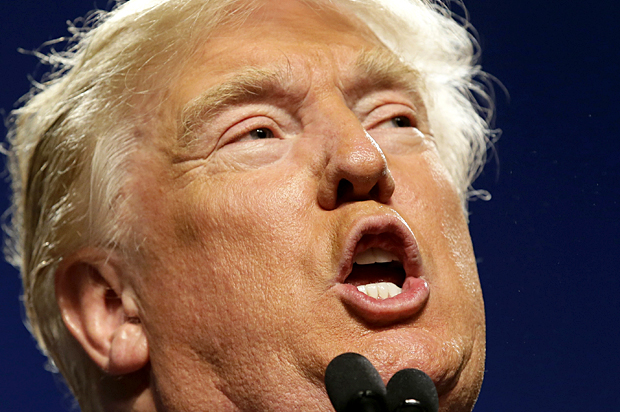You might have noticed, but the Republican Party is in the middle of a massive crack-up. Donald Trump’s continued dominance of the GOP presidential field has catalyzed a division among the Republican electorate and even the party establishment. Elite party members are busily trying to figure out which side they want to be on – in just the last week, Trump has cracked through the establishment’s resistance to his candidacy and picked up a number of big endorsements, from Chris Christie to Jeff Sessions. On the other side, high-level Republicans are either disavowing their own party’s frontrunner or trying to figure out ways to mitigate the electoral damage they see arising from his nomination.
Here’s the New York Times from this past weekend on how Senate majority leader Mitch McConnell, whose newly won majority is imperiled this election cycle, is prepping his troops for an election with Trump on the ticket:
While still hopeful that Mr. Rubio might prevail, Mr. McConnell has begun preparing senators for the prospect of a Trump nomination, assuring them that, if it threatened to harm them in the general election, they could run negative ads about Mr. Trump to create space between him and Republican senators seeking reelection. Mr. McConnell has raised the possibility of treating Mr. Trump’s loss as a given and describing a Republican Senate to voters as a necessary check on a President Hillary Clinton, according to senators at the lunches.
On Monday, McConnell’s chief lieutenant, Sen. John Cornyn, said that he was concerned that nominee Trump would “be an albatross around the down-ballot races.” Republican senator Ben Sasse promised to never support Trump and to abstain from voting if it came to a choice between Trump and Hillary Clinton in November. You have Republican senators from the leadership on down sending strong signals that they don’t want their party’s frontrunner to be the GOP nominee or the next president.
That’s an entirely justifiable and understandable position, given who Trump is and what he represents. But these same senators are, at this very moment, obstructing the selection of the next Supreme Court justice because, they contend, the responsibility and privilege should belong to the person who succeeds Barack Obama as president. They’re arguing at the same time that they want the American people to have a voice in who picks the next justice, and also that one of the likely major-party nominees has no business being anywhere near the White House. And the stronger Trump’s grip on the nomination gets, the less defensible this dynamic becomes.
The Republican case for blocking Obama’s nomination is already tendentious and weak, and it does a poor job of masking its true intent: to deny Obama another justice in the hopes that a Republican wins in November who will restore the 5-4 majority conservatives lost when Antonin Scalia died. But Republicans figured that it’s better to absorb a little political damage over the short term in exchange for a pretty good chance that Scalia’s replacement will be selected by one of their own. Trump’s dominance of the presidential field, however, makes the political risk much more significant and robs Republicans of the only logical argument they had for denying Obama a pick.
If Trump continues to surge as we transition to spring, you’re going to start seeing Republican senators questioned on whether they think Donald Trump – the guy who clotheslined Vince McMahon at Wrestlemania and then shaved his head – is more trustworthy when it comes to selecting high court judges than the constitutional law professor currently in the White House. That is, to put it mildly, a politically difficult question to answer. If they stick with their position that the voters should have a say in choosing the next nominee, then how do they explain the resistance from top-level Republicans to the nominee the voters of their own party have overwhelmingly supported? If they allow that Trump is manifestly unfit for the task of populating the courts, then why are they willing to risk putting him in the position to do exactly that? If their assumption is that Trump will lose and Hillary Clinton will win the presidency, then why are they obstructing in the first place? Oh, right, because they care so deeply about voters “having a voice.”
It makes sense for Republicans to obstruct Obama only if there’s a reasonable chance that a Republican will be elected and the political hits they take in the interim aren’t too severe. With Trump as the likely nominee, though, Senate Republicans acknowledge both that he shouldn’t win and the political price they’ll pay at the polls will be steep. Every benefit of obstruction will evaporate, which will raise questions as to why they’re doing it at all.

